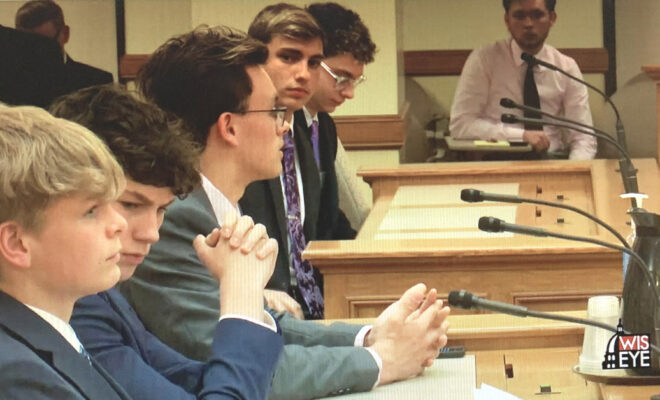Advocating for the future

RHS students listen as Zacharia King tells Education Committee members why he feels it is important to add financial literacy as a statewide graduation requirement. From left, Aiden Ostermann, Brody Kowieski, King, Charlie Heck and Carter Gaber.. Photo courtesy Wis Eye.
Rhinelander teens testify in Madison, support financial literacy
By Eileen Persike
Editor
It was a half-credit class that solidified Rhinelander High School senior Dana Eliason’s path to her future. Already working as a student teller at Ripco Credit Union, Eliason took Patrick Kubeny’s one semester required money management class. It helped her connect the dots.
“When I went into Mr. Kubeny’s classes I fell more in love with that [field] and then I knew in fact that’s what I want to do,” Eliason said. “I learned a lot from working at Ripco, how to write checks, how to save, but when I got into this class I learned how to properly finance a house, finance a car and it just brought it better into my understanding.”

A group of her peers and Kubeny traveled to the State Capitol last week to testify before the Assembly Committee on Education. The students advocated in favor of a bill that would make passing a half-credit financial literacy class a graduation requirement. If it passes, the mandated class would go into effect in 2028. In his 2023-25 state budget Gov. Tony Evers has proposed spending $5 million to help school districts expand financial literacy curriculum.
“It was really cool just to see the process, but also to get up there and argue for your beliefs and see other people do the same it was a really special,” said Charlie Heck, also a senior at RHS. “We’re coming in there with just high school experience and we get to share that.”
Joining Heck were Carter Gaber, Leo Losch, Zachariah King, Brody Kowieski, Andrew Henrichs and Aiden Ostermann, along with Kubeny.
Though unable to attend the session in Madison, Eliason, who will be attending UW-Whitewater in the fall to study finance, said she would have emphasized the importance of allowing young people to learn about money management while in school.
“Our future is riding on this generation and the next generation and the following generation,” said Eliason. “So why not take the chance to let our generation grow. Who knows what our economy could be like if you have a generation that knows how the economy works, knows about interest, how to finance things, how to save properly, how to use a debit and credit card – how to do so much.”
Heck is headed to the University of Arizona, seeking a business degree. Though his family works in the investment and finance business, Charlie said the money management class set him on a career path.
“Obviously, I have a background, with my family, but I think there’s a difference between growing up around it and looking at a stock going up and down versus actually knowing what that means and knowing how you can relate that to your own life – in the classroom and I think that’s really important.”
Looking back on their high school classes, both students said Kubeny’s class was perhaps the most valuable.
“He has these piggy banks and he taught us the 70-10-10-10 rule, where you save 10%, invest 10%, donate 10% and you can spend 70% of what you earn,” said Dana. “You can apply that to your personal life and I personally have opened up a savings account for college so I don’t have to worry about diving into my main savings account. And I will be opening a Roth IRA this semester.”
The class, Kubeny said, is taught in such a way that it does not matter where a student starts. The class begins at square one. Pretesting at the start of the semester finds most students scoring about 50, he said, which is failing. The average student scores an 80 at the end.
“What I try to do for them is give them hope, that this is your chance – if you want to have a different future than what you’ve lived, you have that ability,” Kubeny said. “To inspire and give hope – that’s my favorite part of it is to take some kid who thought ‘life is just to muddle through, woe is me’ and see that spark in them go, ‘wait a minute. You’re right; I get to control my future.’”
What it comes down to, Heck said, is that everyone has the opportunity to learn.
“You can’t force it down anyone’s throat to know this information, but I think it’s a disservice if they’re not given the opportunity to learn it,” said Heck. “Graduating high school without knowing this information, you’re going into the world financially illiterate.”
Leave a reply
You must be logged in to post a comment.




